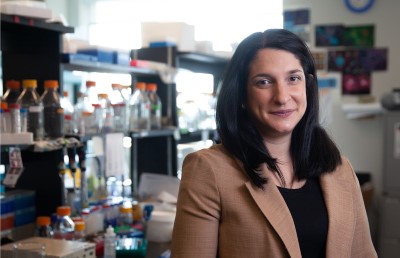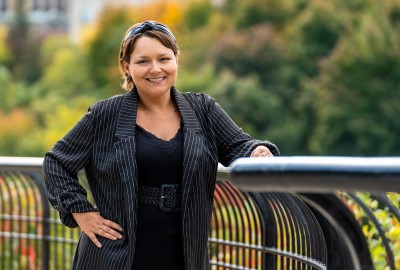 “Every time I see a patient with cancer who can receive CAR-T cells because of our clinical trials, someone who would have lost hope and had no other options, I know that I am doing something worthwhile,” -Dr. Natasha Kekre Researchers at The Ottawa Hospital are partnering with colleagues across the country to expand access to new technology that turns patients’ immune cells into super-charged cancer-killers. This technology, called Chimeric Antigen Receptor T cell (CAR-T) therapy, has proven to be a breakthrough in treating certain kinds of blood cancer and could be harnessed to treat other cancers as well.
“Every time I see a patient with cancer who can receive CAR-T cells because of our clinical trials, someone who would have lost hope and had no other options, I know that I am doing something worthwhile,” -Dr. Natasha Kekre Researchers at The Ottawa Hospital are partnering with colleagues across the country to expand access to new technology that turns patients’ immune cells into super-charged cancer-killers. This technology, called Chimeric Antigen Receptor T cell (CAR-T) therapy, has proven to be a breakthrough in treating certain kinds of blood cancer and could be harnessed to treat other cancers as well.
Thanks to a $4 million grant from the Canadian Institutes of Health Research Clinical Trials Fund, more people across Canada will now have access to CAR-T cell therapy through the Canadian-Led Immunotherapies in Cancer (CLIC) program, founded by The Ottawa Hospital, BC Cancer and BioCanRx.
“This funding will enable a unique trial that focuses not simply on new science, but on bringing groundbreaking new technology to Canadians so that we can all benefit from it as it unfolds,” said Dr. Natasha Kekre, hematologist and scientist at The Ottawa Hospital, associate professor at the University of Ottawa and CLIC principal investigator. “Canadians deserve to be at the front of the line for new cancer therapies and our research focuses on this goal.”
Made-in-Canada manufacturing enables more access to groundbreaking therapy
While Health Canada has approved several commercial CAR-T therapies, access is restricted to people with just a few kinds of leukemia and lymphoma, and only if they fall into certain age ranges. Commercial CAR-T therapy is also very expensive and involves shipping a patient’s immune cells to the United States and back.
CLIC uses a different kind of cell manufacturing technology to turn patients’ immune cells into CAR-T cells – technology that can be used in hospital, right where patients are treated. This opens the door to less expensive and more equitable CAR-T treatment across Canada. It also provides a platform for the development of even better cellular immunotherapies that may work for more kinds of cancer.
Promising results could pave the way for new standard of care
More than 50 patients have been treated in the first CLIC trial, taking place at The Ottawa Hospital and BC Cancer. Promising preliminary results have been presented at the 2022 Cell Therapy Transplant Canada Conference and published in Frontiers in Immunology.
The new funding will enable a second CLIC trial, which will be open to adults with acute lymphoblastic leukemia who are not responding to other therapies. The CAR-T cells will be manufactured in Ottawa, Victoria, Calgary and Winnipeg for use in Ottawa, Vancouver, Calgary, Winnipeg, Saskatchewan and Halifax. Some of the participating hospitals will enroll patients from across their province.
“We hope this trial will lead to Health Canada approval of made-in-Canada CAR-T therapy, so patients across the country can access it as part of routine care and not just through clinical trials,” said Dr. Kekre. “Expanding our CAR-T and biomanufacturing infrastructure in Canada will also enable more Canadian innovations and clinical trials.”
The Ottawa Hospital’s Biotherapeutics Manufacturing Centre will continue to manufacture the viral vector needed to create the CAR-T cells, and will also manufacture the cells for Ontario trial participants.
Young mother gets ‘a fighting chance’
 “I feel better than I’ve felt in a very long time,” said CLIC participant Camille Leahy. “Being able to drive again and take my daughter to her softball games means the world to me. Even if the cancer comes back, this has given me precious time, and I know the research will help many others. It has given me a fighting chance.”
“I feel better than I’ve felt in a very long time,” said CLIC participant Camille Leahy. “Being able to drive again and take my daughter to her softball games means the world to me. Even if the cancer comes back, this has given me precious time, and I know the research will help many others. It has given me a fighting chance.”
For Camille Leahy, a 37-year-old single mother from Newmarket Ontario, CLIC came just at the right time.
Camille was diagnosed with acute leukemia in January 2020. Despite many rounds of aggressive chemotherapy and a stem cell transplant, the cancer kept coming back and by March of 2021, she was out of options.
Fortunately, Camille’s cousin, who works at The Ottawa Hospital, had heard about the CLIC trial and suggested that Camille look into it. Camille was treated on September 15, 2021 and is now cancer-free.
“I feel better than I’ve felt in a very long time,” said Camille. “Being able to drive again and take my daughter to her softball games means the world to me. Even if the cancer comes back, this has given me precious time, and I know the research will help many others. It has given me a fighting chance.”
People like Camille are providing inspiration for patients and researchers alike.
“Every time I see a patient with cancer who can receive CAR-T cells because of our clinical trials, someone who would have lost hope and had no other options, I know that I am doing something worthwhile,” said Dr. Kekre. “Bringing these patients hope and saving some of them is the most rewarding part of my work.”
In addition to Dr. Kekre, principal investigators on the new trial include Dean Fergusson, Kevin Hay, Robert Holt, Jennifer Quizi and Kednapa Thavorn. Co-investigators include John Bell, Harry Atkins, Mark Bosch, Mahmoud Elsawy, Manoj Lalu, Brad Nelson, Justin Presseau, Nicole Prokopishyn, Mona Shafey, and David Szwajcer. Knowledge users include Christopher Bredeson (Principal Knowledge User), Stefany Dupont, Nadine Frisk, Paul O’Connell, Judith Snider and Terry Hawrysh (Principal Knowledge User). Core facilities and resources supporting CLIC include The Ottawa Hospital’s Biotherapeutics Manufacturing Centre, BC Cancer’s Conconi Family Immunotherapy Lab, the Ottawa Methods Centre and the Blueprint Translational Research Group. Additional funding has been provided by BioCanRx, BC Cancer, BC Cancer Foundation, The Ottawa Hospital Foundation, the Ontario Institute for Cancer Research, the Ottawa Regional Cancer Foundation and the Leukemia and Lymphoma Society of Canada.
Learn more about other projects funded through the Clinical Trials Fund, a septic shock trial led by The Ottawa Hospital, and the Accelerating Clinical Trials (ACT) Consortium, co-led by The Ottawa Hospital.
Learn more about participating in research and speak with your medical specialist about specific clinical trials.
About The Ottawa Hospital
The Ottawa Hospital is one of Canada’s top learning and research hospitals, where excellent care is inspired by research and driven by compassion. As the third-largest employer in Ottawa, our support staff, researchers, nurses, physicians, and volunteers never stop seeking solutions to the most complex health-care challenges. Our multi-campus hospital, affiliated with the University of Ottawa, attracts some of the most influential scientific minds from around the world. Backed by generous support from the community, we are committed to providing the world-class, compassionate care we would want for our loved ones. www.ohri.ca
About the University of Ottawa
The University of Ottawa is home to over 54,000 students, faculty and staff, who live, work and study in both French and English. Our campus is a crossroads of cultures and ideas, where bold minds come together to inspire game-changing ideas. We are one of Canada’s top 10 research universities—our professors and researchers explore new approaches to today’s challenges. One of a handful of Canadian universities ranked among the top 200 in the world, we attract exceptional thinkers and welcome diverse perspectives from across the globe. www.uottawa.ca
Media Contact
Jenn Ganton
613-614-5253
jganton@ohri.ca
